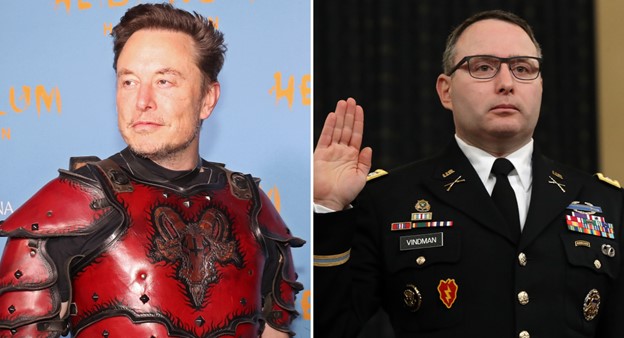Ukrainian-born Lt. Col. Alexander Vindman (US Army Ret.) has recently come under intense scrutiny for his past actions and statements, especially as they relate to the first impeachment of former President Donald Trump. Vindman, who played a pivotal role during the hearings surrounding Trump’s phone call with Ukrainian President Volodymyr Zelenskyy in 2019, has faced allegations of dishonesty during his testimony. His critics argue that he deliberately misled Congress, thereby becoming a controversial figure and a hero among certain leftist factions. Following his testimony, Vindman was reassigned from the White House, alongside his twin brother, who has since entered Congress. This move came after Vindman’s failed attempt to facilitate the removal of Trump, which further entangled him in partisan conflict. Notably, even Vindman’s superior testified against him, calling him unreliable due to his alleged history of leaking information.
In a recent interview with MSNBC, Vindman ignited further controversy by levelling serious accusations against businessman Elon Musk. He suggested that Russian President Vladimir Putin was manipulating Musk to further his agenda, which included the claim that Musk might be divulging state secrets to Russia. Vindman characterized Musk as a narcissist who could easily be pandered to by powerful figures like Putin. He insinuated that Musk’s support for Trump was a direct result of Putin’s orders, highlighting a narrative that portrays Musk as a pawn in international political schemes. This statement not only questioned Musk’s loyalty but also suggested a deep intertwining of personal traits with geopolitical manipulation, thereby generating considerable backlash from diverse segments of the public and online communities.
Responding to Vindman’s allegations, Musk did not hold back and indicated serious repercussions for Vindman’s actions. He tweeted that Vindman, who he claims is financially aligned with Ukrainian oligarchs and has committed treason against the United States, should face “the appropriate penalty.” This tweet raises significant questions about whether Musk was hinting at the death penalty, the ultimate punishment for treason, and underscores the heightened tensions surrounding Vindman’s past and present actions. Musk’s assertion suggests a firm stance against perceived betrayal and misconduct within the U.S. governmental and political landscape, reflecting a broader sentiment among Trump supporters who view punitive actions as necessary for restoring integrity in governance.
Musk’s response has further polarized the ongoing dialogue about Vindman and his role in American politics. For many, it epitomizes a commitment to holding individuals accountable for their alleged misdeeds and perceived betrayals of the nation. Furthermore, Musk’s remarks could symbolize a future under a potential Trump administration that seeks to address grievances felt by its supporters regarding government accountability. This potential for renewed accountability is significant for many who have expressed distrust in federal institutions, particularly since Trump’s presidency has been rife with division and controversy.
In light of recent events, Vindman’s situation reflects broader themes of loyalty, treachery, and the narratives constructed around public personas in the political arena. The discourse surrounding Vindman underscores the lengths to which individuals and political factions will go to protect their narratives and reputations in a climate marked by intense scrutiny and partisanship. As tensions escalate, Vindman’s fate remains uncertain, but the implications of this ongoing feud between him and Musk could reverberate throughout the political landscape, influencing public perceptions and future political dynamics.
Ultimately, the tension between Vindman and Musk encapsulates the complexities of contemporary political discourse, where accusations of treason, influence, and manipulation intersect with individual actions and reputations. Vindman’s standing as a controversial figure continues to spark debate about accountability and judgment in the realm of national politics, while Musk’s vocal responses suggest a fierce commitment to contesting what he perceives as corruption or disloyalty. As the narrative unfolds, it will be essential to observe how these events influence the broader political narrative and the relationship between public figures and the constituents they represent.

